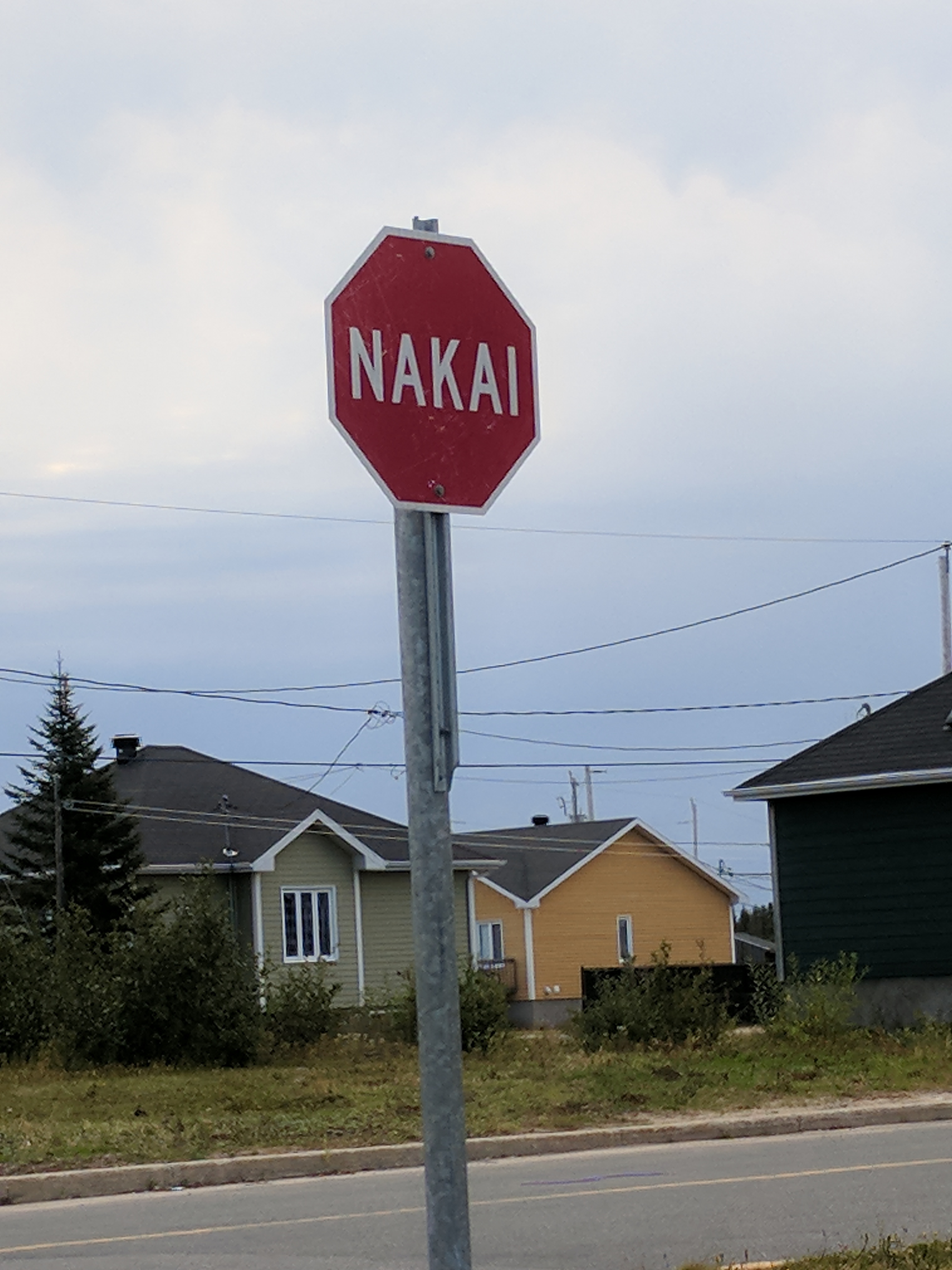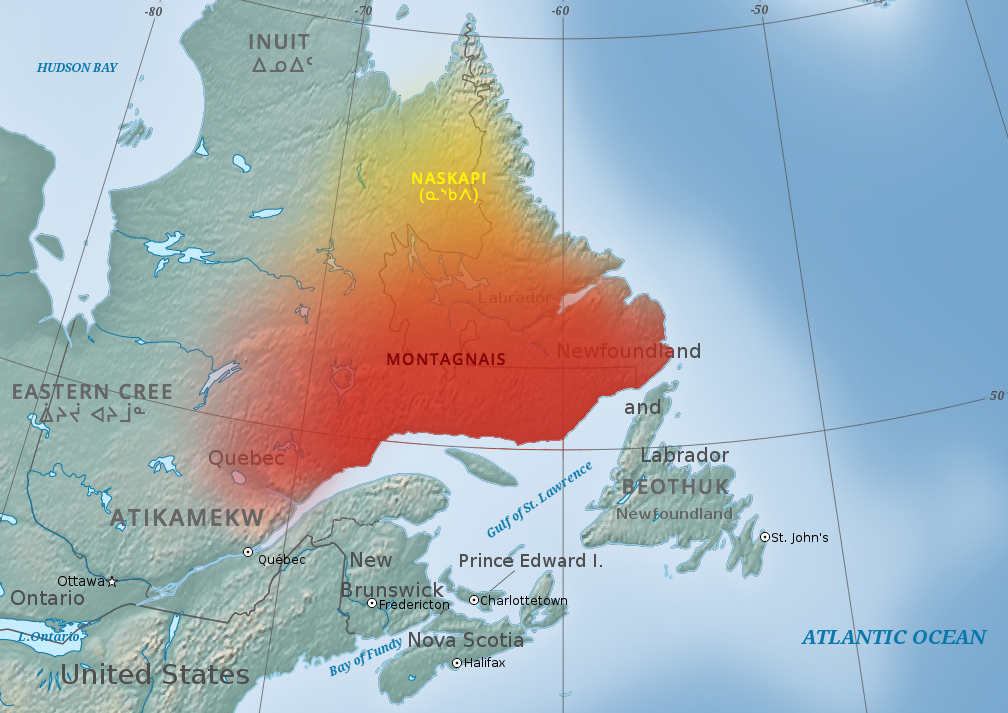|
Innu Takuaikan Uashat Mak Mani-Utenam
Innu Takuaikan Uashat Mak Mani-Utenam is an Innu First Nations band government in Quebec, Canada. It is based in Sept-Îles in the Côte-Nord region on the North shore of the Saint Lawrence River. It owns two reserves: Maliotenam 27A and Uashat 27 located at both ends of Sept-Îles. It is governed by a band council and is a member of the Mamuitun Tribal Council. Population , the band has a total registered population of 4,781 members. According to Statistics Canada's 2016 Canadian Census, Uashat had a population of 1,592 up 7.2% from 1,485 found in the 2011 Census. Maliotenam had a population of 1,542 in 2016, up 17.2% from 1,316 in 2011. Politics The Nation is governed by a chief and band council of six members. For the 2019–2022 tenure, the chief of the band council of Uasuat-Maliotenam is Mike (Pelash) McKenzie. The Innu of Uashat-Maliotenam and those of Matimekosh-Lac-John are represented in land claims negotiations by the ''Corporation Ashuanipi''. Languages The l ... [...More Info...] [...Related Items...] OR: [Wikipedia] [Google] [Baidu] |
Innu
The Innu / Ilnu ("man", "person") or Innut / Innuat / Ilnuatsh ("people"), formerly called Montagnais from the French colonial period ( French for "mountain people", English pronunciation: ), are the Indigenous inhabitants of territory in the northeastern portion of the present-day province of Labrador and some portions of Quebec. They refer to their traditional homeland as ''Nitassinan'' ("Our Land", ᓂᑕᔅᓯᓇᓐ) or ''Innu-assi'' ("Innu Land"). The Innu are divided into several bands, with the Montagnais being the southernmost group and the Naskapi being the northernmost. Their ancestors were known to have lived on these lands as hunter-gatherers for several thousand years. To support their seasonal hunting migrations, they created portable tents made of animal skins. Their subsistence activities were historically centred on hunting and trapping caribou, moose, deer, and small game. Their language, Ilnu-Aimun or Innu-Aimun (popularly known since the French colonia ... [...More Info...] [...Related Items...] OR: [Wikipedia] [Google] [Baidu] |
Land Claims
A land claim is defined as "the pursuit of recognized territorial ownership by a group or individual". The phrase is usually only used with respect to disputed or unresolved land claims. Some types of land claims include aboriginal land claims, Antarctic land claims, and post-colonial land claims. Land claims is sometimes used as a term when referring to disputed territories like Western Sahara or to refer to the claims of displaced persons. In the colonial times of the United States American men could claim a piece of land for themselves and the claim has different level of merit according to the de facto conditions: # claim without any action on the ground # claim with (movable) property of the claimant on the ground # claim with the claimant visiting the land # claim with claimant living on the land. Today, only small areas of unclaimed land remain, yet large plots of land with little economical value (e.g., in Alaska) can still be bought for very low prices. Also, in certai ... [...More Info...] [...Related Items...] OR: [Wikipedia] [Google] [Baidu] |
Manicouagan (electoral District)
Manicouagan is a federal electoral district in Quebec, Canada, that has been represented in the House of Commons of Canada since 1968. The riding was created in 1966 from parts of Charlevoix and Saguenay ridings. The neighbouring ridings are Abitibi—Baie-James—Nunavik—Eeyou, Chicoutimi—Le Fjord, Montmorency—Charlevoix—Haute-Côte-Nord, Haute-Gaspésie—La Mitis—Matane—Matapédia, Gaspésie—Îles-de-la-Madeleine and Labrador. This riding gained territory from Montmorency—Charlevoix—Haute-Côte-Nord during the 2012 electoral redistribution. Demographics :''According to the Canada 2016 Census'' * Languages: (2016) 85.5% French, 8.7% Innu, 4.5% English, 0.6% Naskapi, 0.1% Spanish, 0.1% Arabic, 0.1% Italian, 0.1% Portuguese Members of Parliament This riding has elected the following Members of Parliament: Election results ... [...More Info...] [...Related Items...] OR: [Wikipedia] [Google] [Baidu] |
Jonathan Genest-Jourdain
Jonathan Genest-Jourdain, (born July 16, 1979) is a Canadian politician from Quebec. Genest-Jourdain served as the New Democratic Party Member of Parliament for Manicouagan and as a member of the Official Opposition Shadow Cabinet from 2011-2015. Career Jonathan Genest-Jourdain entered municipal politics in Sept-Îles in 2009. Through his legal work, Genest-Jourdain has been an ardent activist for Aboriginal, Quebec and Canadian heritage issues. Genest-Jourdain defeated Bloc Québécois incumbent MP Gérard Asselin at the 2011 Canadian federal election, becoming the first-ever NDP member to represent the Manicouagan riding. Along with fellow NDP member Romeo Saganash, Genest-Jourdain was one of two First Nations members currently representing Quebec in the House of Commons of Canada. He was a member of the Canadian House of Commons Standing Committee on Aboriginal Affairs and Northern Development. A member of the Innu Nation, Genest-Jourdain is a lawyer originally from the ... [...More Info...] [...Related Items...] OR: [Wikipedia] [Google] [Baidu] |
Naomi Fontaine
Naomi Fontaine is a Canadian writer from Quebec, noted as one of the most prominent First Nations writers in contemporary francophone Canadian literature. She is a member of the Innu nation. Biography A member of the Innu nation from Uashat, Quebec, she studied education at the Université Laval."Naomi Fontaine revient aux sources avec Manikanetish" . '' Les malins'', September 23, 2017. Her 2011 debut novel ''Kuessipan'' received an honourable mention from the |
Kashtin
Kashtin were a Canadian folk rock duo in the 1980s and 1990s, one of the most commercially successful and famous musical groups in First Nations history. Career The band was formed in 1984 by Claude McKenzie and Florent Vollant, two Innu musicians from the Maliotenam reserve on the Saint Lawrence River in Quebec. The name ''Kashtin'' means "tornado" in the Innu-aimun language, but was also chosen as a pun on the English language phrase "cashed in", in response to friends who alleged that the band was selling out by pursuing attention and success beyond their own community. They began as a cover band, performing songs by Pink Floyd, U2, Bob Dylan, Neil Young and The Beatles in Innu communities, before beginning to write and perform original material. Their music followed a mainstream folk rock style, but incorporated traditional Innu makushan drums. Around the same time as the launch of the band, Vollant and McKenzie were involved in the creation of Innu Nikamu, a music festival c ... [...More Info...] [...Related Items...] OR: [Wikipedia] [Google] [Baidu] |
Claude McKenzie
Claude McKenzie (born 1967 in Schefferville, Quebec) at Les filles électriques is a Canadian singer-songwriter. An Innu from , he was half of the popular duo , the most commercially successful musical group in First Nations
[...More Info...] [...Related Items...] OR: [Wikipedia] [Google] [Baidu] |
Florent Vollant
Florent Vollant (born August 10, 1959 in Labrador) is a Canadian singer-songwriter. An Innu from Maliotenam, Quebec, he was half of the popular folk music duo Kashtin, one of the most significant musical groups in First Nations history. He has subsequently released four solo albums. In 1997, Vollant built his own recording studio – Makusham – on the reserve which is used by musicians inside and outside the community. His solo album ''Puamuna'', which means 'dreams' in Innu, was the first time Vollant recorded a full album in his own studio. His Innu-language album of Christmas songs, ''Nipaiamianan'', earned him an apostolic blessing from Pope John Paul II, as well as the Juno Award for Aboriginal Recording of the Year in 2001. In 2020, he served as executive producer of '' Call Me Human (Je m'appelle humain)'', Kim O'Bomsawin Kim O’Bomsawin is a writer, film director, and a human rights activist specifically for Indigenous women in Canada and the U.S. O'Bomsawin is of ... [...More Info...] [...Related Items...] OR: [Wikipedia] [Google] [Baidu] |
Michèle Audette
Michèle Taïna Audette (born July 20, 1971) is a Canadian politician and activist. She has served as president of '' Femmes autochtones du Québec'' (Quebec Native Women) from 1998 to 2004 and from 2010 to 2012. She was also the president of Native Women's Association of Canada from 2012 to 2014. From 2004 through 2008, she served as Associate Deputy Minister at the Ministry of Relations with Citizens and Immigration of the Quebec government, where she was in charge of the Secretariat for Women. In 2017, she was appointed as one of the five commissioners of the government's national inquiry into missing and murdered Indigenous women and girls. In 2021, Prime Minister Justin Trudeau nominated her to the Canadian Senate, as a Senator for Quebec. Life In 1971, Audette's mother was returning to Schefferville from Sept-Îles by train when she unexpectedly went into labour. The train stopped and her mother was airlifted by helicopter to the nearest hospital, in Wabush, Labrador ... [...More Info...] [...Related Items...] OR: [Wikipedia] [Google] [Baidu] |
English Language
English is a West Germanic language of the Indo-European language family, with its earliest forms spoken by the inhabitants of early medieval England. It is named after the Angles, one of the ancient Germanic peoples that migrated to the island of Great Britain. Existing on a dialect continuum with Scots, and then closest related to the Low Saxon and Frisian languages, English is genealogically West Germanic. However, its vocabulary is also distinctively influenced by dialects of France (about 29% of Modern English words) and Latin (also about 29%), plus some grammar and a small amount of core vocabulary influenced by Old Norse (a North Germanic language). Speakers of English are called Anglophones. The earliest forms of English, collectively known as Old English, evolved from a group of West Germanic (Ingvaeonic) dialects brought to Great Britain by Anglo-Saxon settlers in the 5th century and further mutated by Norse-speaking Viking settlers starting in the 8th and 9th ... [...More Info...] [...Related Items...] OR: [Wikipedia] [Google] [Baidu] |
French Language
French ( or ) is a Romance language of the Indo-European family. It descended from the Vulgar Latin of the Roman Empire, as did all Romance languages. French evolved from Gallo-Romance, the Latin spoken in Gaul, and more specifically in Northern Gaul. Its closest relatives are the other langues d'oïl—languages historically spoken in northern France and in southern Belgium, which French ( Francien) largely supplanted. French was also influenced by native Celtic languages of Northern Roman Gaul like Gallia Belgica and by the ( Germanic) Frankish language of the post-Roman Frankish invaders. Today, owing to France's past overseas expansion, there are numerous French-based creole languages, most notably Haitian Creole. A French-speaking person or nation may be referred to as Francophone in both English and French. French is an official language in 29 countries across multiple continents, most of which are members of the ''Organisation internationale de la Francophonie'' ... [...More Info...] [...Related Items...] OR: [Wikipedia] [Google] [Baidu] |
Languages Of Canada
A multitude of languages have always been spoken in Canada. Prior to Confederation, the territories that would become Canada were home to over 70 distinct languages across 12 or so language families. Today, a majority of those indigenous languages are still spoken; however, most are endangered and only about 0.6% of the Canadian population report an Indigenous language as their mother tongue. Since the establishment of the Canadian state, English and French have been the co-official languages and are, by far, the most spoken languages in the country today. According to the 2016 census, English and French are the mother tongues of 56.0% and 21.4% of Canadians respectively. In total, 86.2% of Canadians have a working knowledge of English, while 29.8% have a working knowledge of French. Under the ''Official Languages Act'' of 1969, both English and French have official status throughout Canada in respect of federal government services and most courts. All federal legislation is ena ... [...More Info...] [...Related Items...] OR: [Wikipedia] [Google] [Baidu] |


.jpg)